Agriculture
ThriveAgric partners Mercy Corps to launch its first multipurpose grain cleaning and milling facility in Gombe
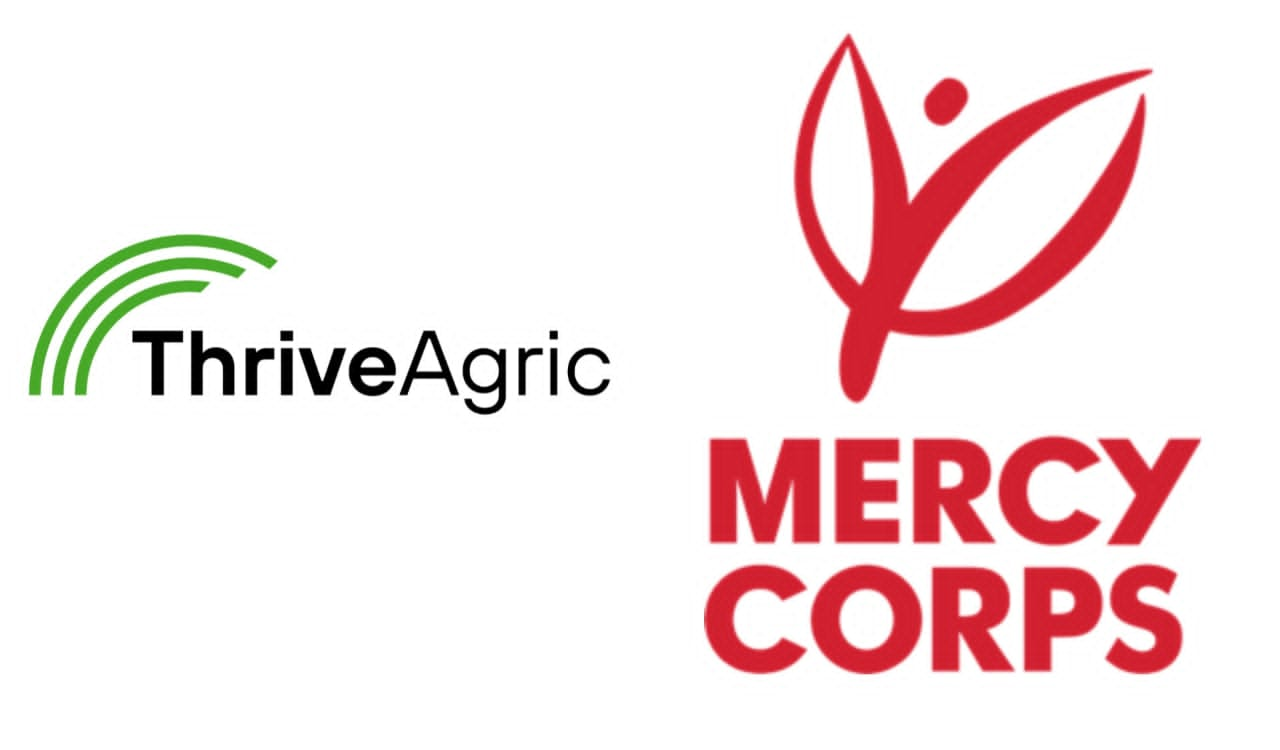
By Our Correspondent
ThriveAgric, a leading agri-tech company committed to advancing food security in Africa in collaboration with Mercy Corps has unveiled its Multipurpose Grain Facility project in Nasarawo Industrial Layout in Gombe State.
The project, which is under the Feed the Future Nigeria Rural Resilience Activity (RRA) initiative is intended to enhance the local economy, empower smallholder farmers and improve the agricultural value chain.
It Is also expected to contribute to Nigeria’s self-sufficiency and economic diversification goals.
As part of the project, a multipurpose rice cleaning and milling facility was established at the layout.
Inaugurating the facility on Wednesday, Gov. Inuwa Yahaya of Gombe State who was represented by the state’s Commissioner for Agriculture and Animal Husbandry and Cooperatives, Dr Barnabas Malle, said that the facility would help to reduce post-harvest losses.
Yahaya said that such losses often caused huge financial losses to smallholder farmers.
He said that the project would complement the State Government’s commitment toward strengthening agriculture and enhancing the lives of smallholder farmers.
He said that rice production plays a crucial role in food security and local livelihoods.
“Our farmers have often faced serious challenges, from post- harvest losses to limited access to modern facilities.
“This new facility, made possible through the collaborative efforts of ThriveAgric and Mercy Corps under the RRA, is a direct response to these challenges.
“It will enhance our ability to process rice efficiently, improve the quality of our yields, and minimise losses that impact both income and food availability.
“This is a catalyst for economic growth as this facility is set to create value addition to the commodity,” he said.
The governor commended ThriveAgric and Mercy Corps for their support, adding that it would reduce poverty and ensure farmers get good returns on their investment.
The Chief Executive Officer of ThriveAgric, Mr Uka Eje, said the initiative was one of the many partnerships aimed at supporting smallholder farmers through value addition.
Eje said that value addition remains a necessary tool to helping farmers to earn more from their labour.
According to him, the project launch symbolises ThriveAgric’s commitment to building an Africa that feeds itself and the world, adding that “by enabling local processing, we’re addressing a core challenge in the agricultural value chain – post-harvest losses while empowering farmers with the tools needed to produce high-quality grains that command better market prices.
“For us, we want to make sure that the farmers are rightly incentivised to go back to farming in order to earn more.
“Agriculture is beyond a cultural activity, it is largely commerce and through this work and initiative, we want to ensure that it is profitable commerce for the smallholder farmers.
“This launch is a groundbreaking achievement as ThriveAgric’s first multipurpose grain cleaning and milling facility.
“We’re not just building infrastructure; we’re creating a sustainable solution that positions Nigerian agriculture for greater economic impact and resilience,” he said.
He said that the rice processing facility would impact 20,000 farmers directly and indirectly.
Also, the Monitoring, Evaluation and Learning Manager of Mercy Corps, Mr Shadrack Gideon, said that the initiative was business model to help drive investment into the state.
Gideon further said that the move would improve smallholder farmers’ incomes, hence he urged them to embrace the initiative.
A rice farmer from Billiri, Mrs Blessing Stephen, said the initiative would greatly assist smallholder farmers, reduce wastage during rice processing, improve rice quality and farmers’ incomes.
Stephen said: “I am happy that we now have this facility where we can clean and process our rice to look like foreign one, this will help us to sell them quickly with more profits.
“It usually took me months to process 100 bags of paddy rice manually.
“And because of the stress, I ended up selling them at give away prices, but now within days I can process all my paddies.”
Our Correspondent reports that the multipurpose grain cleaning and milling facility which is a state-of-the-art facility with a processing capacity of 15-20 metric tonnes will enhance the quality of grains such as rice, maize, and millet by removing impurities like stones and dirt.
The advanced equipment, including temperature and humidity control systems will also ensure that farmers can access premium markets with a projected income increase of up 30 per cent.
With over 50 local job opportunities directly created through the new facility, and an additional boost for agri-SMEs engaged with the One-Stop Shops, the project is set to drive economic empowerment, especially for women and youth.
Agriculture
Propcom+ trains journalists on Climate-Smart Agriculture reporting
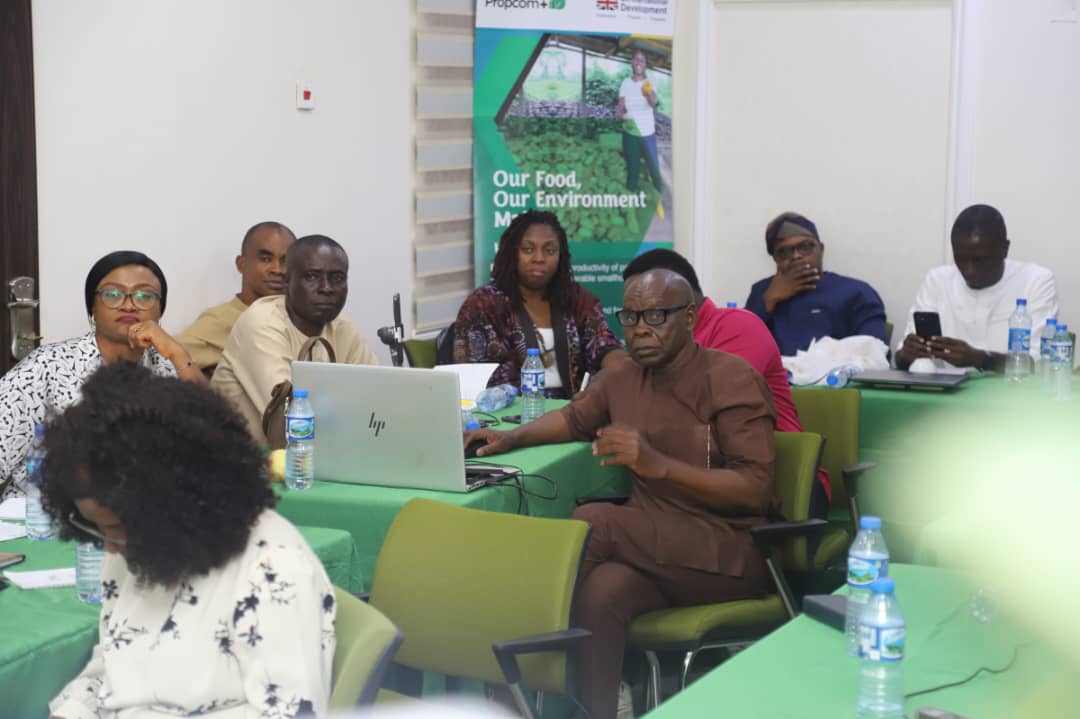
By Our Correspondent
Propcom+ has begun a three-day training for journalists from various media houses in Nigeria to build their capabilities on reporting Climate-Smart Agriculture (CSA).
The training which is being held in Adamawa State is aimed at increasing public understanding of the impact of climate change on agriculture as well as educating them about strategies for adapting to climate change, mitigating its effects, and ensuring food security.
Dr. Adiya Ode, Country Representative and Political Director for Propcom+, while delivering her opening remarks during the media training said the exercise was to equip the journalists with storytelling techniques to create impactful campaigns and raise awareness about climate resilience and food security.
Ode said that the initiative was part of Propcom+ program aimed at empowering smallholder farmers, building resilience, increasing productivity and boosting farmers’ income in the face of climate change.
She described journalists as partners in Propcom+’s strategy to stimulate action, inform the government, and influence public policy related to climate-smart agriculture.
During his presentation, Mr Adam Alqali, one of the facilitators, urged participants to champion CSA towards tackling impact of climate change on agriculture.
Alqali said that the training would equip participating journalists with storytelling techniques to raise awareness about CSA.
He said that the knowledge-sharing event would ensure that information about practical CSA solutions was disseminated more effectively to the public and to farmers in vulnerable communities.
He urged the journalists to adopt solution-driven approach to highlighting issues of CSA.
Our correspondent reports that no fewer than 21 journalists from various media houses from Nigeria are participating in the training which is expected to end on Thursday with a field engagement.
Propcom+ is an eight-year (2023-2030) UK Foreign, Commonwealth and Development Office (FCDO)-funded program working to transform Nigeria’s rural and agricultural sector by supporting climate-resilient and sustainable agriculture.
The initiative aims to benefit people, climate, and nature by empowering over 3.79 million rural farmers—50% women—to adapt to climate change, boost productivity, and protect natural ecosystems, with the goal of improving incomes and fostering inclusive economic growth.
Agriculture
Kano State Govt, Sasakawa Africa Association sign $12.3m deal to boost agricultural mechanisation
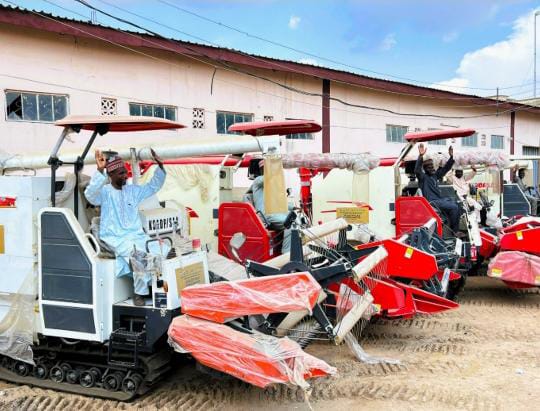
By Our Correspondent
The Kano State Government and the Sasakawa Africa Association (SAA)-Nigeria have signed a $12.3 million Memorandum of Understanding (MoU) to establish mechanisation centres across the state and provide farmers access to improved agricultural equipment and reduce the drudgery associated with agriculture in the state.
The agreement, financed by the Islamic Development Bank (IsDB) and Lives and Livelihood Fund (LLF), marks the beginning of the second phase of the Kano State Agropastoral Development Project (KSADP), which will run from 01 July 2025 to 31 December 2025. The first phase of this project has over the past five years, worked to enhance food security, improve rural livelihoods, and create employment opportunities in the northwestern state.
Speaking at the signing ceremony, SAA Nigeria Country Director, Dr Godwin Atser, said the intervention marks a significant step towards agricultural transformation and sustaining the gains already recorded under the KSADP. He also described the deal as a critical extension of SAA’s ongoing work in Kano State.
“Sasakawa has been a consistent partner to Kano State, supporting smallholder farmers and processors to improve productivity and livelihoods,” he said. “The government’s renewed emphasis on mechanisation necessitated this latest initiative, which builds on the gains of KSADP. Importantly, it will reduce the drudgery of farm labour and ensure sustainability.”
SAA-Nigeria, a Japan-headquartered agricultural development NGO, has operated in Kano for more than three decades and has been deeply involved in supporting agriculture in the state. Through the Cereal Crop Component of the KSADP alone, SAA has reached over 450,000 farmers with an improved package of practices and market-driven technologies across the 44 local government areas of the state, thereby increasing agricultural productivity as well as the incomes of farmers.
According to the Commissioner of Agriculture and Natural Resources, Dr Danjuma Mahmoud. “While much has been achieved under the KSADP, the state government is intensifying its drive towards mechanisation. This includes the establishment of farm service centres, the distribution of machinery, and large-scale technology dissemination through demonstration plots, seed multiplication, and farmer training.”
SAA Project Coordinator of the KSADP, Abdulrasheed Kofarmata, revealed that the funds will be used to procure more than 9000 pieces of heavy and light agricultural equipment and accessories which will aid agricultural activities as it relates to land preparation, planting, crop protection, harvesting and processing.
“I think better days are here for individual and farmer groups in Kano state because this arrangement is going to fund the procurement of tractors and implements, power tillers and implements, combine harvesters, planters, sprayers, rice mills, threshers, solar-powered irrigation systems and a host of others. In addition, it will fund the establishment of 22 medium-scale rice enterprises, 10 artificially aerated onion storage technology facilities, and the installation of 40 maize/cereal flour processing enterprises.”
Agriculture
Inuwa Yahaya Launches Subsidised Fertiliser Sales to Boost 2025 Wet Season Farming in Gombe
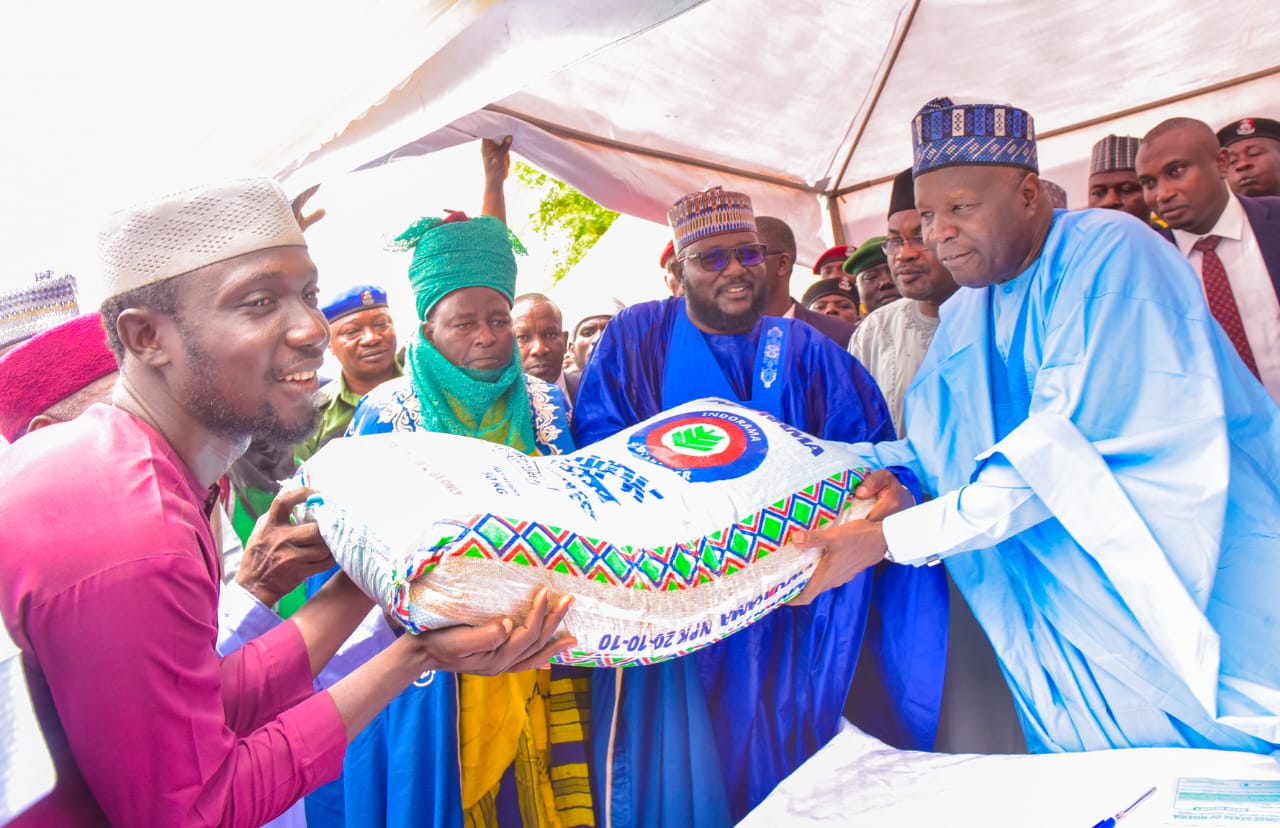
By Our Correspondent
Gombe State Governor, Muhammadu Inuwa Yahaya, has officially flagged off the sales of fertiliser for the 2025 wet farming season, as part of ongoing efforts to boost agricultural productivity and support farmers across the state.
Speaking during the flag-off ceremony, Governor Inuwa Yahaya revealed that the state government had procured a total of 10,000 tonnes of NPK 20:10:10 fertiliser at the cost of ₦44,000 per bag, but will be sold to farmers at a subsidised rate of ₦27,000 per bag. This, he said, is aimed at easing the financial burden on farmers and ensuring access to essential agricultural inputs.
The Governor stressed that timely access to fertiliser is crucial for increasing crop yields, strengthening food security, and driving economic growth in the state.
He directed the State Ministry of Agriculture and Animal Husbandry, in collaboration with security agencies, to strictly monitor the sales and distribution process in order to prevent diversion and ensure the fertilisers reach the intended grassroots beneficiaries.
Governor Inuwa also appealed to farmers to respect designated grazing reserves and cattle routes. He advised herders to avoid grazing on farmlands before harvest, in order to prevent conflicts and safeguard crops.
Earlier, the State Commissioner for Agriculture, Animal Husbandry and Cooperatives, Barnabas Malle, commended Governor Yahaya for his agricultural development strides, particularly the establishment of the 184-hectare Agro-Livestock Industrial Zone. According to him, the zone hosts strategic facilities including an ultra-modern abattoir, an international livestock market, an international grains market, and an inland dry port, among others.
Commissioner Malle also appealed to local government chairmen and stakeholders to cooperate with ministry officials to ensure the smooth and effective implementation of the fertiliser distribution exercise.
In his remarks, the State Coordinator of the Federal Ministry of Agriculture and Food Security, Absalom Akwaras Lansibol, acknowledged the pivotal role of the Gombe State Government in ensuring timely and affordable access to quality farm inputs. He praised the administration’s sustained commitment to agricultural development, noting its alignment with President Bola Ahmed Tinubu’s Renewed Agricultural Transformation Initiative.
-

 Leadership1 year ago
Leadership1 year agoBreaking: African Union Appoints Pantami as Co-Chair of the 4th Industrial Revolution Policy Council
-

 Appointment11 months ago
Appointment11 months agoGombe State Indigene, Appointed New Vice Chancellor (ATBU)
-

 Politics2 years ago
Politics2 years agoFormer Gombe State APC Promoters Forum Chairman Attacked Following Political Commentary
-
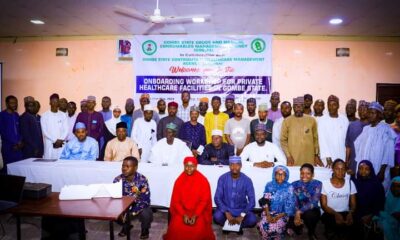
 Health1 year ago
Health1 year agoGombe State Organizes Onboarding Workshop for Private Healthcare Facilities
-

 Death6 months ago
Death6 months agoProminent Nigerian Islamic Scholar, Sheikh Sa’idu Hassan Jingir, Passes Away
-
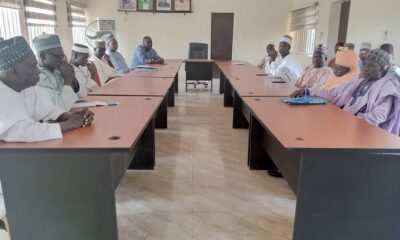
 Water1 year ago
Water1 year agoGombe Government Mobilizes Stakeholders to Combat Illegal Water Connections
-
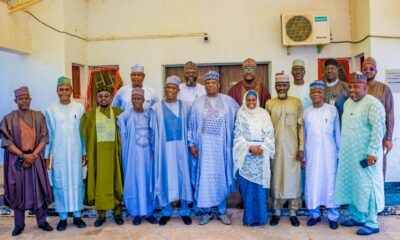
 Politics1 year ago
Politics1 year agoGombe State Inaugurates Human Capital Development Council
-

 Politics1 year ago
Politics1 year agoGombe State Launches Presidential Palliative Program (PPP) to Aid Small Businesses
